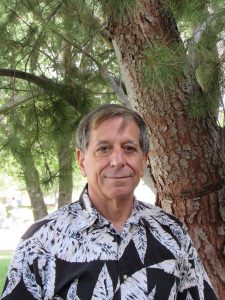Chapman University receives $3.7 million federal research grant to study Alzheimer’s Largest federal grant in the university’s history
Chapman University has earned the largest federal research grant in the university’s history. The National Institutes of Health/National Institute on Aging awarded a $3.7 million grant to Hillard Kaplan, Ph.D., to pursue his research on Alzheimer’s disease. The five-year grant will support Dr. Kaplan’s work with the Tsimane people in Bolivia, as part of a larger project called The Tsimane Health and Life History Project.

Dr. Hillard Kaplan
The Tsimane tribe in Bolivia are of interest to the scientific community due to their unique status in the world of living a relatively isolated existence, speaking their own language, only reproducing within the tribe, and living an active lifestyle due to the lack of modern conveniences. The Tsimane people have a low-prevalence of diabetes, hypertension and artery disease, yet have high levels of infection and inflammation. Dr. Kaplan’s particular interest is in brain aging, with emphasis on dementia and Alzheimer’s.
“Little is known about the incidence, prevalence, and predictors of Alzheimer’s disease in populations living traditional pre-industrial lifestyles similar to those experienced over human pre-history,” said Dr. Kaplan. “This information is critical to determine whether Alzheimer’s disease is a byproduct of modern environments.”
The hearts and arteries of Tsimane men and women age two to three decades slower than us in the U.S. Because of their high levels of activity and low levels of saturated fat in their diet, they have virtually no plaque in their coronary arteries. Arterial health is one factor affecting the risk of Alzheimer’s and this will be the first study on Alzheimer’s on a population with excellent vascular health.
The study has three aims: 1) to conduct long-term assessment of cognitive impairment and dementia with measurement of physical activity between assessments; 2) to conduct neuroimaging of the brain related to cognitive impairment, Alzheimer’s disease and other dementias; and 3) to investigate the epidemiology of brain atrophy, cognitive impairment, Alzheimer’s disease and other dementias.
“The research is time sensitive, as Tsimane are modernizing at an accelerating rate,” says Dr. Kaplan.
“The grant exemplifies the continued growth in science and research at Chapman in exciting new interdisciplinary areas that are supported by funding agencies like the National Institute of Aging (NIA),” said Tom Piechota, Ph.D., vice president of research at Chapman University.
The official name of the grant project is Brain atrophy, cognitive impairment and Alzheimer’s in a low CVD-risk population. The research will use state-of-the-art bio imaging technology, and a representative sample of 1,310 Tsimane adults aged 40 and higher. The project will leverage 14 years of Tsimane research.
Dr. Kaplan is a member of Chapman University’s Economic Science Institute.
About Chapman University
As an academically distinguished center of learning, Chapman University attracts extraordinary students and faculty from around the globe. Its ten schools and colleges foster a vibrant intellectual community, and provide extensive opportunities for students to learn, grow and discover alongside remarkable faculty. The University is home to some 8,000 students pursuing bachelor, master and doctoral degrees, and is alma mater to more than 40,000 alumni found throughout the United States and the world. Now celebrating its 156th year, Chapman is known for its distinguishing strengths in leadership and civic engagement, in the arts and entertainment disciplines, and in specialized sectors of technology and science. The University is comprised of its main campus in Orange, California, and the Rinker Health Science campus for graduate health science programs in Irvine, California. Visit us at www.chapman.edu.
Follow us on Facebook at: Chapman University Facebook
On Twitter and Instagram at: @ChapmanU
On YouTube at: Chapman University YouTube Channel
###
Categories
Recent Posts
- ANNETTE BENING, ED ASNER, AND GARY COLE JOIN CAST CRITICALLY ACCLAIMED PLAY BRINGS THE HUMAN EXPERIENCE OF WARFARE TO LIFE
- DISNEY EXECUTIVES AND OTHER ORANGE COUNTY LEADERS JOIN CHAPMAN UNIVERSITY GOVERNING BOARDS
- Chapman University’s Office of the Provost and Musco Center Presents Provost’s Arts & Lecture Series
- General H. R. McMaster visits to commemorate partnership between Chapman University and Richard Nixon Foundation
- More Category 5 Hurricanes Forecasted by Scientists
Archives
- October 2018
- September 2018
- August 2018
- May 2018
- April 2018
- March 2018
- February 2018
- January 2018
- December 2017
- November 2017
- October 2017
- September 2017
- August 2017
- July 2017
- June 2017
- May 2017
- April 2017
- March 2017
- February 2017
- January 2017
- December 2016
- November 2016
- October 2016
- September 2016
- July 2016
- June 2016
- May 2016
- April 2016
- March 2016
- February 2016
- January 2016
- December 2015
- November 2015
- October 2015
- September 2015
- August 2015
- July 2015
- June 2015
- April 2015
- March 2015
- February 2015
- January 2015
- December 2014
- November 2014
- October 2014
- September 2014
- August 2014
- July 2014
- June 2014
- May 2014
- April 2014
- March 2014
- February 2014
- January 2014
- December 2013
- November 2013
- October 2013
- September 2013
- August 2013
- July 2013
- June 2013
- May 2013
- April 2013
- March 2013
- February 2013
- January 2013
- December 2012
- November 2012
- October 2012
- September 2012
- July 2012
- June 2012
- May 2012
- April 2012
- March 2012
- February 2012
- January 2012
- December 2011
- November 2011
- October 2011
- September 2011
- August 2011

